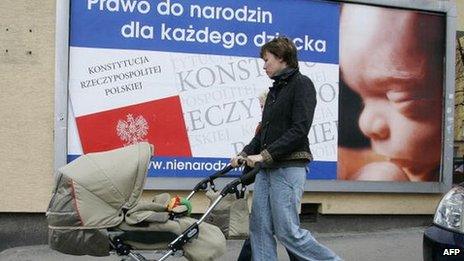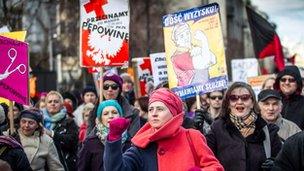Polish rape victim 'should have had abortion access'
- Published

Poland's abortion laws are among the strictest in Europe
A Polish teenager who became pregnant after rape should have had unhindered access to an abortion, the European Court of Human Rights has ruled.
The girl, who was then 14, was forced to have a clandestine abortion after harassment from pro-life groups led to her being turned away from hospitals.
The court ordered the Polish state to pay the teenager and her mother 61,000 euros (£49,000) in compensation.
Poland's abortion law is among the strictest in Europe.
Terminations are only permitted in cases of rape, incest or when the life of the mother or foetus is in danger.
'Manipulated and helpless'
The unnamed teenager at the centre of this court case became pregnant in 2008 after she was raped at the age of 14.
In accordance with the law, she got a certificate from the public prosecutor confirming that her pregnancy was as a result of unlawful sexual intercourse.
The girl, named only as "P" went to two different hospitals with her mother in her hometown of Lublin in south-east Poland to try and obtain an abortion.

Pro-choice Poles want the Catholic Church to have less influence over abortion law
At one, a Roman Catholic priest attempted to convince her to have the child. Hospital management then issued a press release saying they would not perform the procedure, leading to her case becoming caught up in Poland's ongoing debate about abortion.
The girl then travelled to a hospital in Warsaw, but doctors there said they were under pressure not to go ahead with the procedure.
The court documents say the pair left the hospital "feeling manipulated and helpless", after which they were harassed by pro-life groups and eventually taken in for several hours of police questioning.
The authorities then accused the mother of trying to force her daughter into having an abortion and had "P" placed in a juvenile shelter.
She eventually managed to go ahead with the termination in Gdansk, 500km from her home, after the Ministry of Health intervened in the case.
In their ruling, which is subject to appeal, a panel of judges at the European Court of Human Rights found that there had been numerous breaches of the girl's rights.
The court found that she should have had unhindered access to lawful abortion and that the details of her case should not have been made public by hospital authorities.
The BBC's Adam Easton in Warsaw says that Poland's abortion law is unlikely to become more liberal soon.
Poland's Catholic church is fiercely opposed to any attempts to ease the restrictions and a majority of mainstream politicians support the status quo.